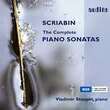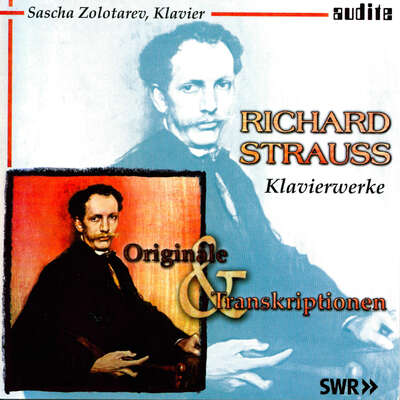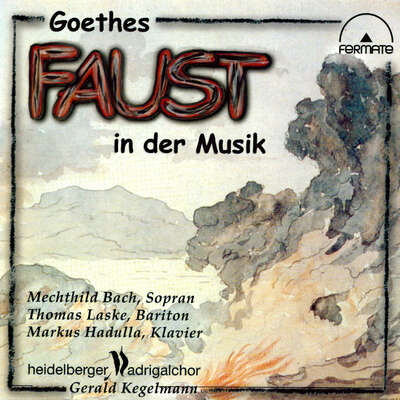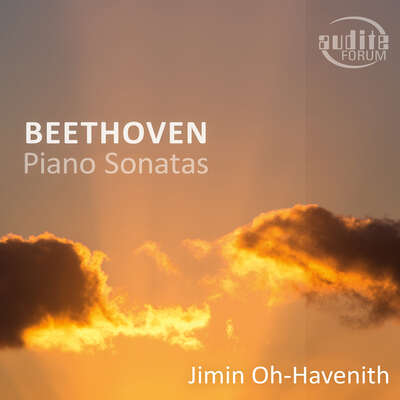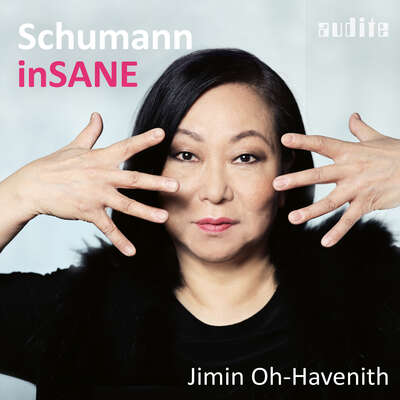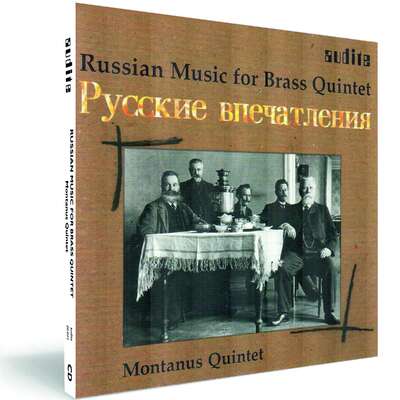
Wenige Pianisten haben sich der Herausforderung einer zyklischen Interpretation der Klaviersonaten Alexander Skrjabins im Konzert gestellt. Neben der immensen spieltechnischen Herausforderung steht die Bewältigung eines hochkomplexen gedanklichen und emotionalen Kosmos, in dem – von Werk zu...mehr
"Vladimir Stoupels Einspielung ist wohl eine der besten Gesamtausgaben überhaupt und deshalb auch besonders schwierig zu kommentieren. Das Dreifachalbum ist deshalb so gelungen, weil der Pianist nicht in die musikalischen Klischees verfällt, die sich bei oberflächlicher Beschäftigung mit Skrjabins Werk aufdrängen können." (Arte)
Titelliste
Details
| Alexander Scriabin: The Complete Piano Sonatas | |
| Artikelnummer: | 21.402 |
|---|---|
| EAN-Code: | 4022143214027 |
| Preisgruppe: | BCE |
| Veröffentlichungsdatum: | 1. Mai 2008 |
| Spielzeit: | 167 min. |
Zusatzmaterial
Informationen
Wenige Pianisten haben sich der Herausforderung einer zyklischen Interpretation der Klaviersonaten Alexander Skrjabins im Konzert gestellt. Neben der immensen spieltechnischen Herausforderung steht die Bewältigung eines hochkomplexen gedanklichen und emotionalen Kosmos, in dem – von Werk zu Werk fortschreitend – die Töne zum Vehikel werden auf dem Weg in die Transzendenz. In Skrjabins Oeuvre stehen die Klaviersonaten wie Marksteine in der Entwicklung von spätromantisch-virtuoser Pianistik unter dem Einfluss von Chopin und Liszt hin zu einem absolut einmaligen Individualstil, in dem Material, Form und Technik alle Hüllen der Konvention abstreifen und sich einem geradezu manischen Ausdruckswillen unterordnen. Die Gesamteinspielung der Klaviersonaten durch Vladimir Stoupel dokumentiert wie kaum eine andere diese Entwicklung und verbindet dabei die Spontaneität des Live-Erlebnisses mit der Geschlossenheit einer Gesamtschau, wie sie nur durch die tour de force zyklischer Aufführungen und nahtlos sich anschließender Aufnahmesitzungen zu erreichen ist.
Stoupel spürt in den frühen Werken den Keim des Kommenden heraus und lässt den stilistischen Wandel ab der 5. Sonate dadurch mehr als Metamorphose denn als Bruch erscheinen. Erstaunlich ist die Verwandtschaft mit Skrjabins eigenem Klavierspiel, wie sie durch eine Reihe von Welte-Mignon Aufnahmen aus dem Jahr 1910 dokumentiert ist: große agogische Freiheit im Auskosten der Phrasen, lyrische Zartheit und Verschattung neben virilem, bisweilen sogar aggressivem Auftrumpfen, alles in permanentem, quecksilbrigem Fluss, in dem sogar die tiefste Schwärze noch zu luziferischem Leuchten gebracht wird.
Der russische Pianist Vladimir Stoupel zeichnet sich durch außerordentliche Vielseitigkeit, kompromisslose musikalischer Intensität und technische Virtuosität aus. Sein Repertoire ist ungewöhnlich umfangreich und vielfältig. Als Konzertsolist ist Vladimir Stoupel regelmäßig zu Gast bei führenden Orchestern in Europa und in den USA und bei internationalen Musikfestivals. Über seine solistische Tätigkeit hinaus ist er als ausgezeichneter Kammermusiker und Liedbegleiter, sowie als Dirigent bekannt. Vladimir Stoupel ist seit 1985 französischer Staatsbürger und lebt heute in Berlin.
Besprechungen
American Record Guide | May/June 2009 | Harrington | 1. Mai 2009
My other complete Scriabin Piano Sonata recordings are two-disc sets that include additional works besides the ten sonatas (Ashkenazy on Decca 452961Mehr lesen
I set up a spread sheet to compare timings and yes, Stoupel takes more time on every movement of every sonata than either Ashkenazy or Hamelin. I tossed in a few Sofronitsky and Horowitz times just to complete the picture. After several complete hearings, I believe that Stoupel has a strong affinity for Scriabin and great intellect to sort everything out clearly in some of the densest piano music of the 20th Century. The recorded sound is excellent and the big climaxes are as powerful as any on records. Yet, he fusses over little details and uses much more rubato than the others. There are times when the music almost stops and simply hangs in the air. Movements that
should dance tend to plod.
The Ninth Sonata, Black Mass in the hands of Sofronitsky, conjures up images of demons with cloven hooves darting in and out of the shadows. Stoupel's devil is massive, slowly breathing fire and laying waste to all that come before him. Ashkenazy's Fifth Sonata easily switches gears in and out of Impetuoso and Languido and Presto con allegrezza. Stoupel has all the necessary technique to manage the treacherous difficulties here, but when he hits the Languido section and shows us his wonderful dynamic control, all forward momentum comes to a halt. We are reduced to waiting for the next note.
The Tenth Sonata, with all of its trills and tremolos, builds, under Horowitz, to a shattering climax. Stoupel gets caught up in all of the minute dynamic markings. I heard new things in his performance, but I want the kinetic energy of Horowitz. For the money, Ashkenazy can't be beat. Yet, even though the other great performances mentioned here might edge Stoupel out, I like this music enough to want all of these recordings, including his. Any time I can hear a good performance, especially when it perks up my ears and makes me think anew about the music, I consider it worthwhile.
Fanfare | March/April 2009 | Peter J. Rabinowitz | 1. März 2009
The stopwatch is notoriously unreliable when it comes to describing performances, especially when it comes to music as variable in its ebb and flow asMehr lesen
I suspect that no one could sustain the music at these glacial tempos – but if any pianist could, he or she would have to depend on a kind of textural clarity and plasticity of phrasing that, on the evidence here, Stoupel simply doesn’t possess. These are bass-saturated performances in which the bottom register (in alliance with the right foot) often covers everything else that’s going on (listen to the left-hand octaves in the third movement of the First). And even when the main material is audible, motivic profile is weak and contrapuntal lines are insufficiently differentiated: rarely has the climax of the Ninth sounded so much like aimless banging. As for the music’s long lines: Stoupel’s shortness of breath often gives the music a foursquare quality that makes the readings sound even more lethargic than they are (try, as but two examples, the huff-and-puff phrasing of the Eighth or the heavy-lifting in the climaxes of the Tenth).
In sum, these are dark, heavy, and unsubtle performances that lumber where they should leap, insist where they should hint, and drone on where they should come to the point. If Hamelin, especially in the late music, gives us an aquarium of darting iridescent tropicals, what we get here is a tank stocked with jellyfish.
Isn’t there anything here to enjoy? Sure: the still opening of the Fourth, the uneasy harmonic haze in the third movement of the Third, the wide dynamic range capped by an overpowering sonority in the climaxes throughout (the second movement of the Second and the Sixth are especially imposing). But for the most part, this is playing in which Scriabin’s fire has been doused and his transgressive ecstasy transformed into deadly duty. As I’ve said often, Hamelin’s rapturously airy cycle (20:1) is my benchmark; but even for readers ready to duplicate, there are lots of preferable alternatives. Kasman’s hard-hitting set (29:3) provides an especially illuminating second opinion; so does Ogdon’s sometimes manic tour of the repertoire. Then, of course, there are classic recordings of individual sonatas by Richter (his Carnegie Fifth is especially imposing, 29:6), Horowitz, Sofronitsky, Kun Woo Paik, and Wild. Even with Audite’s excellent engineering, this release – the only cycle ever to require three CDs – simply isn’t competitive.
www.ClassicsToday.com | January 2009 | Jed Distler | 30. Januar 2009
While most Scriabin sonata cycles occupy two CDs, Vladimir Stoupel'sMehr lesen
HiFi & Musik | NR 1-2 2009 | SJ | 1. Januar 2009
På tre CD har det tyska kvalitetsbolaget Audite fått rum med AlexanderMehr lesen
Pizzicato | 12/2008 | Rémy Franck | 1. Dezember 2008 Psychedelisch!
Galt bisher die Gesamtaufnahme der Sonaten durch Igor Shukow als Referenz, muss man nicht neben, sondern vor diese Einspielung jetzt auch diese neueMehr lesen
Hier passiert tatsächlich etwas, wenn man eine der CDs in den Player legt (und ich habe bewusst nicht mit der ersten Sonate begonnen, sondern mich gleich in die mystischeren späten Sonaten vertieft). Der erste Eindruck kam vom Klavierklang. So einen wohlproportionierten, natürlichen und den Hörer unmittelbar in Scriabins Welt versenkenden Sound hört man nicht oft. Das Klavier hüllt den Hörer sozusagen ein, nimmt ihn in sich auf, wird eins mit ihm, eine Wirkung, zu der natürlich die rauschhafte, psychedelische Musik Scriabins beiträgt. Man braucht nur die Augen zu schließen, und dann ist man in jenem irrealen Ambiente, in dem die Musik die perfekte Sinnestäuschung vollzieht, Körper und Geist leicht macht und uns durch Eis und Schnee, durch Feuerbälle und Lichtbögen jagt, durchs Dunkel wie durchs Sonnenhelle, wo nichts mehr greifbar wird und alles entschwindet. Stoupel bringt uns das gewaltige Herz des Komponisten so nahe wie sonst selten ein Pianist, mit einer Expressivität, der keine Grenzen gesetzt zu sein scheinen, mit pianistischen Mitteln, die vom Flüstern bis zum erregten Schrei reichen, mit Lyrismus wie mit Perkussion jene unendlichen Räume der Musik durchfliegen, die sich längst von der gemarterten Welt gelöst haben, Räume, wo nichts mehr greifbar ist, wo wir transzendiert die Särge der Wahrheit einer längst ausverkauften Erde hinter uns lassen.
www.musicweb-international.com | October 2008 | Gary Higginson | 31. Oktober 2008
This is a worthwhile and valuable box of Scriabin’s sonatas. It’s especially good having them under one roof, as it were, especially when playedMehr lesen
Friedrich Sprondel says in his booklet notes that the First Sonata of four movements can remind one of Chopin but oddly enough Rachmaninov came across to me. The score lacks pedalling indications but Stoupel tries manfully to cope with the complex of contrapuntal writing. Despite the passionate anger which Scriabin put into the work due to his arm injury and despite the commitment of Stoupel the work remains diffuse and without a clear structure. It is not a piece I will return to.
The Second Sonata is quite different. The impressionist textures of the long opening movement - there are just the two - are presented wonderfully. It’s true that the work’s complex rhythmic patterns are not put across but I’m not sure if that actually matters in the beauty and haze of a sound that prefigures Ravel. The second movement is marked presto and is a virtuoso piece which is actually quite difficult to follow in the score. On the whole, I prefer Alexander Melnikov on Harmonia Mundi (HMN911914) simply because I can hear more detail. The performance by Stoupel does however remain both fine and very enjoyable.
The Third Sonata is the most romantic. It is in four movements and nominally in F sharp minor. Its use of chromatic sequential passages, especially in the fourth movement is not only sometimes tedious but also, despite various key signature changes, makes a mockery of the key.
The first and third movements have related material as does the second and the fourth. The second movement has a very beautiful second idea, marked mostly pp which is almost reminiscent of Grieg. The third movement has a very memorable melody which Scriabin seems sad to leave. In this recording the work ends up being the longest in the set by far. I must confess to preferring Bernd Glemser on Naxos (8.555368) who not only shaved well over six minutes off the overall time but gives a tighter rendition of the outer movements giving them a greater feeling of direction. After all the finale is marked Presto! The problem seems to be sometimes that Stoupel is so keen to bring out the inner parts under the melody that a real sense of melody is lost.
I was encountering the Fourth Sonata for the first time. It’s a short work of only two movements in another obsessively sharp key. The second is a faster and more developed version of the first but I wasn’t surprised that it dated from the period of the Second Symphony. Here the chromaticisms are no longer decorative but add, especially in the first movement, a feeling of the mystical which from now on is to be significant.
When it comes to the Fifth Sonata Stoupel seems to come into his own. The Third and Fourth had been inspired by poetry but at the head of the score of the Fifth four lines are quoted beginning “I summon you to life, secret yearnings”, the words which Scriabin also used for his ‘Poem of Ecstasy’ completed at the same time. Indeed it shares many characteristics with the Poem. These include the use of augmented harmonies which never seem to resolve, in ever chromatic passages; this despite the lack of major/minor key structures and despite his insistence on using key signatures such as F sharp, E major, Db major. The two works are in one movement. The booklet notes for the Fifth Sonata just offer ‘Allegro impetuoso - Con stravaganza’ but it is not all like that. Indeed after just ten seconds we collapse into a 5/8 section marked Languido. Both ideas return and others offer similar sudden contrasts. This is where Stoupel wins over many other pianists: he is able to hold up these quixotic changes and still give a firm sense of structure. Unfortunately the recording here and in the set as a whole seems to be too bass heavy and the upper register of this piano is rather brittle. My advice is that you turn up the volume slightly above normal but reduce the bass. This produces a sound that is rich and warm.
The Sixth Sonata is of the same length and is also in one unbroken span, a form Scriabin was to adopt from now on. The so-called ‘mystical chord’ is used right from the start. It can also be heard as a significant sound in ‘Prometheus - The Poem of Fire’ which had just been completed. This chord, which commences the Sonata, consists of a perfect fourth, a diminished and an augmented fifth. The latter two intervals form the opening of the whole tone scale and this Debussian sound again draws the best from Stoupel. He obtains a silky tone from the unnamed piano. Scriabin was apparently frightened of this sonata and never performed it himself. It is for the most part written on three staves and is punctiliously full of expression marks.
The Seventh Sonata is subtitled ‘The White Mass’ the title being connected with the mystery of Man’s relationship with the universe. It is even more improvisatory, chromatic and even atonal than the previous sonatas and yet culminates in a massive twenty-four note chord. I just wish that Stoupel had followed Scriabin’s extraordinary markings a little more carefully. Often he seems to overlook ‘poco vivo’ or even ‘molto piu vivo’ and what about those marvellous bars marked Presto ‘en un vertige’. Sadly he misses that moment. Just recently I heard the late Ruth Laredo’s recording of this work (Nonesuch 73035-2) and was knocked over by her passion, total accuracy to the score and delicacy of touch and of pedalling. Look out for it.
The Eighth Sonata is my especial favourite. I suspect that this may be due, at least in part, to its clarity of form. The Lento introduction is so contrapuntally complex that Scriabin was forced to notate several bars onto four staves. The first subject is marked Allegro agitato and Stupel is neither Allegro nor agitato which is an emotion much needed at that point. When the ideas are recapped later he captures the mood more successfully. The ‘Tragique’ second subject is much more convincing and even more deeply felt later in the recap. Stoupel has a real grasp of the slow, dreamy sections but the faster ones sometimes find him becalmed in his reverie. A 6/8 Presto section, when it first comes half way through, is rather overlooked and the following Allegro seems to be of the same tempo. Nevertheless despite these points this is, overall, a beautiful and convincing performance.
We know that Scriabin had an obsession with the diabolical. The Ninth Sonata is subtitled ‘Black Mass’ though it was not his choice. In addition it seems to hover around the interval of the diminished fifth - the so called ‘Devil’s interval’. Despite these factors in this performance the Ninth Sonata certainly comes across as a beautiful and evocative piece. It is compact in form and length just quoting briefly at the end a reminiscence of its oscillating opening. For the Allegro section which constitutes the final third of the sonata, Stoupel takes a while to ease himself into the tempo. Once on his way it makes for a very impressive virtuosic display and reaches an almighty climax.
So we arrive at the Tenth and last sonata. Not for nothing has it been called the ‘Trill’ Sonata’. They are there because, to quote the composer, “this is a sonata about insects … Insects are born of the sun”. Its form is remarkably similar to the Ninth Sonata. I haven’t mentioned the myriad French expression instructions with which Scriabin litters the sonatas, phrases like “avec une ardeur profonde et voileé” and “ avec ravissement et tendresse”. Stoupel is excellent in this work and tries consistently to present to us these different markings. He is that little bit more careful and deliberate than Glemser as mentioned above and I feel that that is right in this physically demanding and intricate work.
Despite certain reservations, and wouldn’t it be remarkable if there were none, this is a fine set. In addition one’s admiration must go out to any pianist who can tackle these ten works and record them at a rate it seems of two a day. Although I have other versions there are moments in these performances which I shall treasure.
Fono Forum | November 2008 | Mario-Felix Vogt | 12. Oktober 2008 Wechselhaft
Alexandr Skrjabins Klaviersonaten stellen aufgrund ihrer exorbitanten pianistischen Ansprüche und ihrer strukturellen Komplexität eineMehr lesen
Das Auskosten dieser lyrischen Momente, das Stoupel als sensibel nuancierenden Pianisten mit beachtlichem Klangsinn ausweist, geschieht allerdings häufig auf Kosten der „großen Linie“. Die eigentlich kompakte einsätzige fünfte Sonate gerät deshalb episodenhaft, Ähnliches gilt auch für den Kopfsatz der vierten Sonate. Weiterhin ist seine dynamische Gestaltung bisweilen undifferenziert, dann hat sein Piano die gleiche Intensität und „Misterioso“-Farbe wie ein vorangegangenes Pianissimo. Außerdem ist sein Spiel stellenweise auch etwas kraftlos und weich. Dann fehlt im Kopfsatz der dritten Sonate das dramatische Moment, in der siebten Sonate „Weiße Messe“ Brillanz und rhythmischer Schwung und in der neunten Sonate „Schwarze Messe“ schließlich der diabolische Furor.
Im Kopfsatz der ersten Sonate trifft er hingegen den heroisch-aggressiven Gestus und in der sechsten den mystischen Grundton. Am überzeugendsten ist seine Darstellung der achten Sonate, sie besticht durch ihre mystisch-nachdenkliche Grundstimmung, kantable melodische Linien und elegant ausgeführte Figuren. Der Klang ist ausgewogen und rund, nur im Bass-Bereich bisweilen etwas diffus.
Arte | September 2008 | Mathias Heizmann | 9. September 2008
Alexander Skrjabin: Die Klaviersonaten (Gesamtausgabe)
Der russische Pianist Vladimir Stoupel legt eine der besten Gesamtausgaben der „Klaviersonaten“ von Skrjabin vor. Eine wegweisende Interpretation
Um sich an eine Gesamtausgabe von Skrjabins „Klaviersonaten“Mehr lesen
Radio Bremen | Nordwestradio, Kammermusik | Wilfried Schäper | 5. September 2008
Der in Russland geborene Pianist und Dirigent Vladimir Stoupel hat ein wahres Mammutunternehmen vollendet: Auf drei CDs spielt der KünstlerMehr lesen
L'éducation musicale | n° 21 - Septembre 2008 | 1. September 2008
Rares sont les pianistes à avoir osé programmer – au concert –Mehr lesen
Diverdi Magazin | 173 / septiembre 2008 | Arturo Reverter | 1. September 2008
En la búsqueda del éxtasis
Vladimir Stoupel graba para audite todas las sonatas para piano de Alexander Scriabin
A través de sus diez sonatas Scriabin nos cuenta, de manera sucinta, su evolución como músico, nacido a la sombra de la herencia de Chopin y Liszt,Mehr lesen
Hay también mucho de poético en las formulaciones de Scriabin, que se inspiró no pocas veces en escritos suyos o de su segunda mujer. Todo ello configura uno de los universos más sugerentes y excitantes de la literatura pianística que transcurre en la transición del XIX al XX. El músico supo concentrar magistralmente en estas sonaras, y en muchas otras composiciones – estudios, preludios, valses, poemas, variadas piezas –, todo ese turbulento mundo que le preocupaba, angustiaba y obsesionaba y del que emanaba un lirismo en ocasiones enfermizo pero siempre efectivo, incluso efectista, y, por supuesto, extraordinariamente atractivo y que tanto ha cautivado a los más grandes pianistas. Desde Sofronitsky a Horowitz o Gieseking, casi todos los artistas del teclado han buscado traducir a sonidos las peculiares, a veces tan lisztianas, partituras de nuestro compositor. Vladimir Stoupel es uno de los que últimamente se han interesado en él.
No conocíamos a este pianista ruso más que de lejanas referencias. No ha grabado demasiado. Por lo que hemos escuchado, es un excelente instrumentista y buen músico, que desarrolla, según se nos dice, también su actividad en el campo directorial y que reside en Berlín desde 1985. Es un artista todavía relativamente joven, que nos muestra en estas interpretaciones una considerable madurez intelectual y expresiva, un criterio musical de primer orden y una capacidad analítica que puede en ciertas oportunidades, no en todas, no estar de más en la exposición de obras frecuentemente alucinadas, que se nos ofrecen como fulgurantes perpetuum mobile de agitado discurrir, como atribuladas muestras de un postromanticismo casi liquidado.
Stoupel posee la técnica adecuada y el entendimiento justo para brindarnos unas interpretaciones que nos dejan ver las luces y las sombras de las composiciones, en ocasiones más bien esquinadas pese a su relativa brevedad. En general creemos que el artista frasea con pulcritud, con finura, con exquisita matización, respira con lógica y llega a establecer una atmósfera poética muy sutil en instantes muy definitorios, así en los soliloquios del Allegretto y el Andante de la Sonata n° 3 o en el comienzo, salvados los primeros compases, de la n° 5, sobre la que planea, no podemos evitarlo, la rupturista y abreviada recreación, ya casi histórica, de Richter (concierto en Varsovia, 1972). Pero Stoupel nos gusta mucho, por ejemplo, en el inicio, pianísimo, de la n° 4.
Nos parece que, con todas sus virtudes, su férreo control de acontecimientos, su mesura en los tempi, su equilibrio general, las interpretaciones de este pianista no están siempre embargadas de esa pátina arrebatada, de ese apasionamiento urgente, de ese relampagueo que antecede a la locura o al éxtasis que suele entreverar la mayoría de estas partituras y que podemos respirar y aspirar de una forma más virulenta, en otras aproximaciones salidas, por ejemplo, de las manos de un Ashkenazi, cuya integral (Decca) en dos CD, en lugar de tres, con el aditamento de otras piezas, es una excelente recomendación alternativa: o de las del joven Subdin, de quien hablábamos hace pocos meses. En todo caso, Stoupel es más fino y más sólido que otros pianistas que han grabado recientemente este corpus sonatístico, como Robert Taub (Harmonía Mundi) o Marc-André Hamelin (Hyperion).
Audiophile Audition | August 13, 2008 | John Sunier | 13. August 2008
The maniacal composer began under Chopin’s influence but developed aMehr lesen
klassik.com | Juli 2008 | Jan Kampmeier | 25. Juli 2008 | Quelle: http://magazin.k... Keine Apokalypse
Skrjabins Werke sind bei uns eher selten im Konzert zu hören, ihreMehr lesen
BBC Radio 3 | 12 July 2008 | Kevin Bee | 12. Juli 2008
But first let's hear some impressive Scriabin from Russian pianist andMehr lesen
Bayern 4 Klassik - CD-Tipp | 26. Juni 2008 | Michael Schmidt | 26. Juni 2008
Alexander Skrjabin war nicht nur ein visionärer Komponist und virtuoser Pianist, sondern auch ein Mystiker und Prophet, der die Welt mit seiner KunstMehr lesen
Alexander Skrjabin war nicht nur ein visionärer Komponist und virtuoser Pianist, sondern auch ein Mystiker und Prophet, der die Welt mit seiner Kunst in einen ekstatischen Zustand der Auflösung und Verwandlung versetzen wollte. Als letzte und größte Lebensaufgabe plante er ein "Mysterium", eine Art synästhetisch-liturgisches Ritual aus Tönen, Farben, Düften, Bewegungen und Berührungen. Das "Mysterium" sollte in einen orgiastischen Tanz der Teilnehmer und dann in einen kosmischen Liebesbrand münden. Skrjabins Ekstasemystik trägt deutlich erotische Züge. In seinen musikalischen Werken äußern sich diese als typische Steigerungsverläufe vom sehnsüchtigen Erwachen bis hin zur orgiastisch-triumphalen Verwandlung. Dieses auch für Skrjabins Klaviersonaten so typische Verlaufsprinzip zeigt sich zum Beispiel in seiner 4. Sonate aus dem Jahr 1903, deren sehnsüchtig-träumerisches Anfangsthema nach komplexen Verwandlungen und Steigerungen eine gewaltige Metamorphose durchmacht. Als Mischung aus den verstaubten Archiven Chopins und der Sonne van Goghs beschrieb der russische Schriftsteller Boris Pasternak einmal die Musik seines Landsmanns Skrjabin. Bei Henry Miller erzeugte sie Empfindungszauber aus "Eisbad, Kokain und Regenbogen".
Skrjabins komplexes, zwischen Spätromantik und Expressionismus oszillierendes Ouevre ist überwiegend auf das Klavier fokussiert und stellt höchste musikalische sowie technische Ansprüche. Nur wenige Pianisten haben sich der Herausforderung einer zyklischen Interpretation seiner zehn Klaviersonaten gestellt. Zu ihnen gehört nun auch der russische Pianist Vladimir Stoupel, der mit französischem Pass in Berlin lebt und als Geheimtipp für spätromantische Klaviermusik gilt. So zart und zugleich so sehrend wie bei Vladimir Stoupel hat man den sehnsüchtig-träumerischen Anfangsteil von Skrjabins 4. Klaviersonate noch nicht gehört. Dabei akzentuiert Stoupel besonders die Mittelstimmen, deren drängende Chromatik den Begehrenscharakter dieser Musik prägt. Und wenn die Sonate aus diesen Sehnsuchtskeimen zu immer rauschhafteren Steigerungen erblüht, dann gestaltet er das weniger mit rasenden Tempi oder krachender Lautstärke als vielmehr klanglich-gestisch, mit lyrischer Expressivität. Stoupels Interpretationsstil fasziniert auch bei Skrjabins Spätwerk wie zum Beispiel der 9. Sonate aus dem Jahr 1913, die der Komponist selber als "Schwarze Messe" bezeichnete. Als "Entweihung des Heiligtums" charakterisierte Skrjabin den fortschreitenden Verzerrungsprozess des chromatisch absteigenden, zugleich düsteren und sehnsüchtigen Anfangsgebildes dieser Sonate. Im Finale erscheint dieses Gebilde dann zu einem martialischen Marsch gesteigert. Wohltuend enthält sich Stoupel hier wie in seiner gesamten Sonaten-Neueinspielung jeglichem bloß vordergründigen Abbrennen pianistischer Feuerwerke. Dafür lässt er sich immer wieder auf die oft ambivalenten Stimmungslagen ein, was seinem Skrjabin-Spiel eine magische Subtilität verleiht. Mit seiner agogischen Freiheit erinnert es zudem an Skrjabins eigenen Klavierstil, der durch einige Welte-Mignon-Aufnahmen aus dem Jahr 1910 dokumentiert ist.
Österreich | 21. Juni 2008 | (kh) | 21. Juni 2008
Skrjabin. Der russische Komponist Alexander Skrjabin (1872-1915), dessenMehr lesen
NDR Kultur | Neue CDs | 11.06.2008 15:30 Uhr | Friederike Westerhaus | 11. Juni 2008
Er war ein Komponist, der Grenzen sprengen wollte: der Russe Alexander Scriabin. Das traditionelle Schema der Sonate lehnte er ebenso ab wie - inMehr lesen
Alexander Scriabin war wohl einer der größten Exzentriker der Musikgeschichte - und ein unverbesserlicher Egozentriker. In seinen Werken kreist er um sich selbst. Anfangs geht es noch um Erlebnisse wie eine romantische Nacht am Meer, die er in der zweiten Sonate thematisiert.
Doch dann dringt Scriabin immer weiter in sein Innerstes vor. Für Vladmir Stoupel eine große Herausforderung.
"Was macht diese Musik so unglaublich komplex, ist die Tatsache, dass Alexander Scriabin es geschafft hat, sein Unbewusstes in eine sehr strikte musikalische Form zu gießen. Das sind sozusagen Rundgänge durch das Unbewusste."
Die Strukturen der Musik
Die Entwicklung von den frühen spätromantischen Sonaten hin zur Atonalität der späten Sonaten zeichnet Stoupel schlüssig nach. Die Strukturen der Musik werden deutlich, versteckte Melodien hörbar und auch orchestrale Klangfarben lassen sich erkennen. Man spürt, wie eingehend sich Stoupel mit dem Zyklus beschäftigt hat. Dabei hat ihm geholfen, alle Sonaten auswendig zu spielen.
"Für mich spielt das eine sehr große Rolle: wenn man diese Sachen auswendig spielt, dann öffnen sich die Schichten in meinem Unterbewusstsein, die ich mit den Noten nicht öffnen kann."
Technisch sind die Sonaten zum Teil extrem anspruchsvoll. Eine der Schwierigkeiten: Scriabin hatte schon früh eine Verletzung an der rechten Hand. Es heißt, das sei der Grund dafür, dass die linke Hand in seinen Klavierwerken besonders beansprucht wird. Doch Stoupel ist diesem Problem gewachsen:
"Ich bin auch vielleicht in einer etwas besseren Position als manche Kollegen, weil ich ein verkappter Linkshänder bin."
Ein zentrales Thema
Doch mindestens genauso problematisch wie die technische Seite ist die Ausdrucksebene der Sonaten. Ab der sechsten Sonate gab es für Scriabin ein zentrales Thema, das sogenannte "Mysterium". Er glaubte an ein gigantisches Gesamtkunstwerk, einen liturgischen Akt mit seiner Musik: in Indien sollte sich die Menschheit dabei in einem ekstatischen Ritus vereinigen und zu einer höheren Bewusstseinsebene aufsteigen. "Weiße Messe" heißt die 7. Sonate von Scriabin.
"Ich verspüre etwas von diesem transzendentalen Zustand, wenn ich seinen Sonaten spiele. Es ist sehr sehr schwer für einen Interpreten, einerseits in diesen transzendentalen Zustand zu kommen - dieser Zustand kann sehr rauschhaft sein - und gleichzeitig die Kontrolle zu behalten."
Doch zu viel Kontrolle? Die Transzendenz, die Stoupel zu spüren glaubt - sie überträgt sich nicht auf den Hörer. Der Taumel, der auch den Zuhörer erfassen müsste, bleibt aus. Und so wird der ungeheuer überhöhte, überfrachtete Ausdrucksgehalt dieser Musik zwar intellektuell nachvollziehbar, aber nur in Maßen emotional erfahrbar. Es lohnt sich sehr, diese Einspielung zu hören. Aber es bleibt eine Distanz, die bei Skrjabin eigentlich nichts zu suchen hat.
WDR 3 | HörZeichen, 31.05.2008, 14:45 | Christian Kosfeld | 31. Mai 2008
Das Klavier war das wichtigste Ausdrucksmittel von Alexander Skrjabin, desMehr lesen
